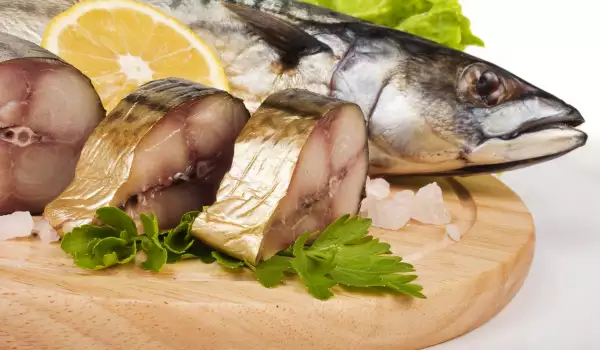Mackerel (Scomber scombrus) is one of the most widely consumed fish in the world. It is widespread and popular because it is very affordable, has a subtle hidden taste and great health benefits.
Mackerel is a marine fish. The family has about 16 species of mackerel scattered throughout different climates and parts of the world. They are up to 50 cm long, weighing 1.5 - 1.7 kg in the rarest cases.
The record for most mackerel caught is in Norway. Mackerel is most common in the Atlantic Ocean and associated seas - the Baltic, the Mediterranean, and more. Black Sea mackerel spends the winter in the Marmara Sea, and near the Bulgarian coast, it can be seen in April-June It is known as mackerel and returns again in September to January quite nourished.
Mackerel has a streamlined shape. Most common are common mackerel and kalyos, which differ in patterns. Ordinary mackerel has visible streaks in its strong upper body points, which is not usually the kalyos type.
The meat of mackerel is thick, less dry than some other fish and gray in color, turning dark on the sides. The meat is high in fat, which is higher than in ordinary mackerel. There is a very distinctive and strong smell of fat in sea fish.

The trend of fish numbers is falling, and this includes the population and mackerel. In the Black Sea, it is one of the most endangered animals. Globally, mackerel is one of the most important fish, along with tuna and herring, it is one of the most widely consumed fish.
It was one of the most important foods for the survival of coastal ancient peoples in Europe. Once the catch of mackerel nets in the Mediterranean Sea and the Marmara Sea was extremely high. So much so that even some historians call it "cornucopia". But today's Black Sea mackerel is disappearing. Other types of mackerel are also Spanish mackerel, king mackerel, and rainbow mackerel.
Composition of mackerel
Mackerel is a source of many proteins and fats, which are abundant in fish caught in winter in the northern regions. 100 g of mackerel has about 13 grams of fat, which makes it automatically in one of the most fatty fish. In a portion of 100 g of mackerel there is about 18g. of proteins that absorb three times faster than beef protein.
Although an oily fish, mackerel is low in calories. Required daily calorie intake of the average man can be filled by 700 g of whole mackerel. This species is a very important source of Omega-3 fatty acids, unsaturated, and only negligible amounts of its fat contain cholesterol.
Furthermore, it is full of large doses of minerals - potassium, phosphorus, fluorine, sulfur, zinc, chloride, sodium, and the full spectrum of vitamins C. It has biggest concentration of vitamin B12 and vitamin PP.

100 g of Atlantic mackerel contains:
Calories: 205 Kcal
Calories from fat: 125 Kcal
Fat: 13.9 g
Saturated Fat: 3.3 g
omega-3 fatty acids : 2.6 g
cholesterol : 70 mg
Protein: 18.6 g
Sodium: 90 mg
Potassium: 314 mg
Iron : 1.6 mg
Selection and storage of mackerel
Mackerel can be found in any state - from freshly caught, to frozen whole, gutted, headless, only fillets, smoked, salted, and preserved in vegetable oil or tomato sauce . Also widespread is canned mackerel in brine, with Greek sauce, or the famous "Breakfast" and "Ropotamo".
If you choose fresh fish, look into its eyes and ithey are very dull, do not buy it. Fresh fish always has a clear look and emits a pleasant sea smell. Once caught, mackerel tends to lose its luster, so you should look for fish with shiny skin.
Culinary use of mackerel
Mackerel is often present at our table, because it is very easy to prepare and goes well combined with various ingredients. Mackerel can be prepared in every way - fried, grilled or stewed and steamed. Larger mackerel is suitable for grilling, while smaller specimens can be prepared with tomato sauce in the oven, or any other combination to your liking.
The taste of mackerel goes well combined with ingredients with high acidity - tomatoes, lemons and more acidic and sharp tasting sauces. Any citrus suits the preparation of mackerel.
It is better not to freeze mackerel because it is oily fish. However, if you want to cook frozen mackerel, it is important to note that there is no need to defrost it completely before you cook. Leave it to stand out a while and cut the semi-frozen mackerel, grilled it is incredibly tasty, tender and juicy.
The other thing you can do is season it with salt, pepper and a little lemon juice. Substitution of mackerel are considered bluefish, perch and tuna. Suitable to drink with meal mackerel are wines such as Chardonnay and Sauvignon Blanc.

Benefits of mackerel
Mackerel has many great health benefits and useful features. Firstly it should be noted that this species has abundant amounts of omega-3 fatty acids. They are beneficial to the skin, the heart, the brain, nervous system, acting pre-emptively against many diseases, including Alzheimer's .
The powerful antioxidant Omega-3 helps to strengthen the cell membranes of the body at the expense of free radicals. These are radicals that can penetrate cell walls and disrupt their activities. This gives rise to a number of diseases, including cancer. To avoid this, it is important to eat the right products.
For people with asthma, regular consumption of broiled mackerel is recommended. Because unsaturated fatty acids are found in mackerel, it is food that fosters harmonious growth and the development of children. It is very useful for pregnant and lactating women. For adolescents, mackerel is also an important food that can prevent an imbalance between the growth and development of internal organs.
B vitamins help in the synthesis of DNA and are involved in the metabolization of fat. If you regularly include mackerel is your meals, you can adjust the levels of blood sugar in your body. Moreover, this fish helps the digestive system and the nervous system. It tends to support the formation of hemoglobin and saturation of blood with oxygen.
Helpful fats in mackerel are important for our brain, skin and hair. Phosphorus in fish helps the construction of many enzymes that are engines of chemical reactions in the cells. Again, because phosphoric acid, which is the fabric of the human skeleton, mackerel is useful not only for children, in which bone is being formed, but adults, because over the years problems with the musculoskeletal system appear.





















